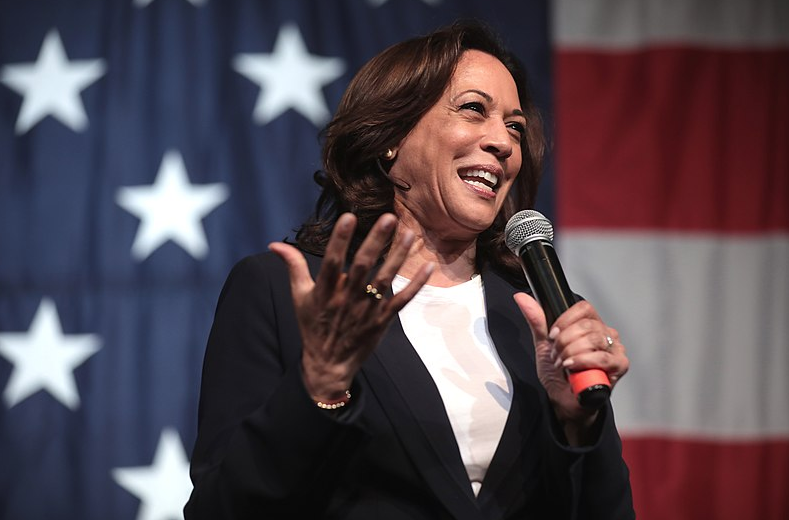With less than three weeks until the election, it’s a nerve wracking time here in the United States. Some call it a battle for the soul of the nation. Certainly the stakes could not be higher. This election will determine the future of the United States and in some respects, the world.
As a journalist, I strive to be balanced, and talk about the facts of any situation. I try not to air my personal preferences on the BBC. But this election year, I’m not pulling any punches about what an immoral and polarizing president Donald Trump has been. His dangerous impacts on civil rights, the environment and our standing in the world have and will have far reaching consequences. Another four years is unthinkable.
For these reasons, I’m backing the Biden-Harris ticket and joined the Vote Forward campaign to send handwritten letters to unregistered voters in swing states. Our goal is to convince silent voices that their vote matters and we’re urging them to take part and vote on November 3rd.
For all those afraid to speak up and speak out, Kamala Harris is a profound inspiration. This quote resonates for me and I hope it does for you:
“You are powerful and your voice matters. You’re going to walk into many rooms in your life where you may be the only one who looks like you. But remember that you are not alone. We are all in that room with you, applauding you. Cheering your voice. So you use that voice and be strong.” Kamala Harris
Kamala’s words helped me speak out during my last BBC World Service appearance when I called Trump xenophobic and described his immigration policy “a lose-lose” for America. Find out below what I meant by that.
You can listen to the segment on the BBC World Service podcast, starting at 35:50.
Check out the Fresh Dialogues podcast below:
I had a lively conversation about immigration and innovation with the BBC’s Rahul Tandon and Andy Xie, an influential Chinese economist, based in Shanghai. Andy shared some insights about the Chinese education system that may surprise you.
Here is a transcript of our discussion, (edited for length and clarity).
Rahul Tandon: Alison, when you talk to people about the election, and the issues that are going to decide who people are going to vote for, where does immigration figure in that?
Alison van Diggelen: Immigration is an important issue, especially in Silicon Valley. There was a lot of backlash when Trump clamped down on H1B visas for skilled workers in Silicon Valley. A lot of tech CEOs spoke up and said it’s going to have a net effect of reducing jobs for American workers. To Andy’s point about people feeling unwelcome in America, Trump has been explicit and implicit about his xenophobic attitude, because he knows that it plays to his base.
I think this is going to be a double whammy for America: The first loss is the immigrant innovation benefit that’s given America its competitive edge and has led to (the creation and dominance of) Silicon Valley.
The second loss is that it energizes Trump’s base and helps him potentially get re-elected. So I think Trump’s immigration policy is a lose-lose for America.
Rahul Tandon: A lot of Indians will tell you that Silicon Valley is made up of a lot of Indians. A lot of these big companies’ bosses did come from India (eg Google’s Sundar Pichai). Do you think these conversations are different if you went to a state like Texas?
Alison van Diggelen: Yes, it’s possible. Silicon Valley does face competition from Austin in Texas. It’s seen as the upstart to Silicon Valley. But what’s coming from Trump is this general feeling of: you’re not welcome if you’re an immigrant. It’s like shooting the country’s economic powerhouses in the foot.
Rahul Tandon: Andy, do you think some of the president’s rhetoric will put some Chinese students off going to the United States?
Andy Xie: Oh, yeah! The issue in China is that you have to decide very early if you want to go abroad for college education.
Rahul Tandon: How early?
Andy Xie: In primary school you have to decide if you want to compete in the local college entry examinations or go abroad. Usually the preferred location is the US. So now a lot of parents are saying: maybe UK, maybe Australia? But still, the US has a lot more top universities than anywhere else. The Chinese system is very rigid… What’s going on is a huge problem for hundreds of thousands of people in China.
Rahul Tandon: Alison, we know there’s a high unemployment rate in the US, is that heightening the debate about immigration? Are we hearing more Americans saying: there are just not enough jobs here, what the president is talking about makes sense, we can’t let more people in.
Alison van Diggelen: Certainly his base believes that, they’ll believe anything he says. But the facts that the BBC’s Manuela Saragosa reported, from the experts, show the opposite. Trump and his supporters are blind to the facts, just like they’re blind to the science of climate change. The fact is that more than 60% of those working in computer, math and science in Silicon Valley are foreign born, and that’s not a coincidence. Silicon Valley needs that skilled workforce in order to do what they do.
Listen to Manuela’s immigration report, starting at 27:00 in the BBC podcast.
Read and listen to more reports and dialogues with the BBC.
Kamala Harris Photo credit: Gage Skidmore, Peoria, Arizona, 2019




